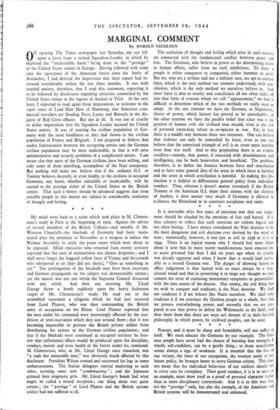The confusion of thought and feeling which arise in such
matters are connected with the fundamental conflict between peace and war. The Germans, who believe in power as the determining factor in human affairs, suffer from no such inhibitions. To them a people is either conqueror or conquered, either hammer or anvil. But we, who are a civilian and not a military race, are apt to confuse force, which is the only method our enemies understand, with con- ciliation, which is the only method we ourselves believe in. And since force is akin to cruelty and conciliation all too often slides off into that form of evasion which we call "appeasement," we find it difficult to determine which of the two methods we really want to adopt. At the one extreme we have the German, or Napoleonic, theory of power, which history has proved to be unworkable ; at the other extreme we have the pacifist belief that since war is the greatest of human evils the civilised man should, even at the risk of personal extinction, refuse to co-operate in war. Yet, in fact, there is a middle way between these two extremes. One can believe that violence can only be controlled by force, even as one can believe that the unresisted triumph of evil is an event more horrible even than war itself. And to this proposition there is an evident corollary—namely, that power, if exercised with determination and intelligence, can be both benevolent and beneficial. The problem, therefore, is to define the frontier between force and conciliation and to have some general idea of the areas in which force is harmful and the areas in which conciliation is harmful. In making this dis- tinction it is helpful to differentiate general policy from individual conduct. Thus, whereas it doesn't matter overmuch if the British Tommy or the American G.I. share their rations with the children of Aachen, it does matter very much if Germany is allowed to n.ilitarise the Rhineland or to construct aeroplanes and tanks.


























 Previous page
Previous page